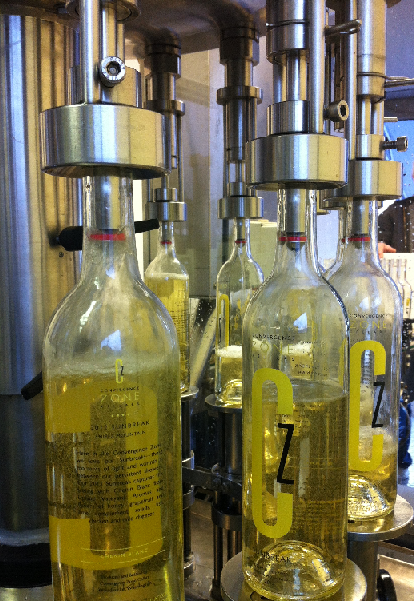Earlier this week the big news in the Washington wine industry was the announcement of a collaboration project between the highly acclaimed Betz Family Winery and the Stellenbosch estate of DeMorgenzon Winery called Quinta Essentia. Sourced from four vineyards of old, head-trained bush vines, this South African Chenin will be produced in a dry style and retail for $40 a bottle.
Like many Washington wine lovers, I was intrigued. This was certainly an interesting spin for the fabled Washington winery which has long been known for its outstanding reds. It also made sense giving the South African heritage of the winery’s new owners, Steve & Bridgit Griessel. However, it also left me a little dishearten in that it looks like Washington Chenin blanc is being left in the dark once more.

There is just not enough sunbreaks (and good Chenin blanc like this example from Convergence Zone Cellars in North Bend) in the Pacifc Northwest.
Back in 2011, Sean Sullivan of the Washington Wine Report (and now Washington editor of Wine Enthusiast magazine) wrote a terrific article about why Chenin blanc deserves saving . At the end of the article he makes a recommendation for several Washington Chenin blancs, all of them on the off-dry or sweet side, with the driest being Marty Clubb’s L’Ecole 41 Chenin blanc sourced from 30+ year old vines planted in 1979. At around 4000 cases a year, L’Ecole remains practically the lone champion of the grape in Washington State with a bottling that is likely to be available at retail and restaurants. There are other producers with a passion for Chenin in the state, like Scott Greenberg of Convergence Zone Cellers, but these are usually made in very small quantities that are sold through the wineries tasting rooms and wine clubs. Even still, very few of these Chenin blancs are truly dry.
This is disappointing because in other markets (particularly the East Coast), wine consumers are getting hip to what sommeliers and wine geeks have been crowing about for some time–that Chenin blanc makes some mouth-watering and outrageously delicious dry wines with layers of complexity that can match a vast array of cuisine. In a foodie culture like the Pacific Northwest which embraces the flavors, charms and fusion of Asian, Latin and African dishes with ease, you would think that a grape that embraces the balance of acidity, texture, aromatics and fruit so seamlessly as Chenin blanc would be right on the table.
But its not and I think a big reason for this is that no one, outside of L’Ecole 41, has really made a big bet on Washington Chenin blanc and no one has taken the chance to produce and market some of the electricfyingly dry styles that are capturing people’s attention across the globe. This is why it was so disappointing to see that Betz’s new project was going to focus solely on South African Chenin blanc. It’s clear that the Griessels and Master of Wine Bob Betz know good Chenin. So when they took the bold step of introducing the first white wine to their portfolio, and chose to look beyond Betz Family Winery’s home state, it felt like a damning write-off of the potential of Washington Chenin blanc.
“Quinta Essentia emphatically confirms why Chenin Blanc is one of the world’s great white grape varieties… This is not the overcropped, insipid quaffer that Chenin has most often become in the U.S. This is old vine Chenin Blanc, conscientiously grown in a unique site, crafted by a skilled artisan.” — Betz news release
Betz is both right and wrong here. Yes, for a long time US Chenin blanc has sucked. But it doesn’t have to be this way. Just think of how exciting it would have been if Betz announced their collaboration with DeMorgenzon and took a page out of Allen Shoup’s book with Long Shadows or Chateau Ste. Michelle with Eroica and Col Solare. What if, instead of just doing a single South African bottling, they set out to change wine lover’s impression of American (and by extension, Washington State) Chenin blanc as being an “overcropped, insipid quaffer”. Working hand in hand with their South African partner, Betz could have done something truly unique in creating two companion bottles, one from Washington State and one from Stellenbosch, made with the same skill and care, that demonstrates the terroir and incredible potential of Chenin blanc. A project that would have combined the credibility and renown of Betz with the passion and respect for Chenin blanc of South Africans would have been just the jolt that this little underdog grape needs here in the Pacific Northwest.
If only Betz was willing to take a bet on Washington Chenin blanc.
